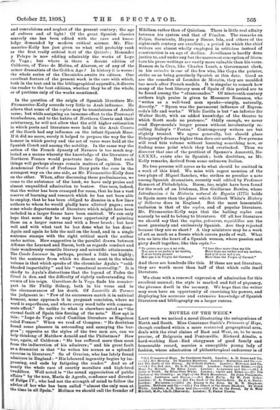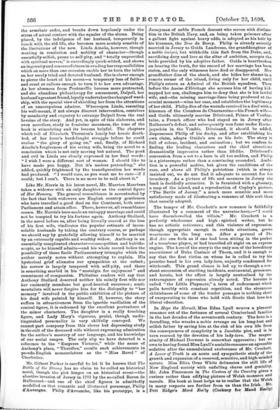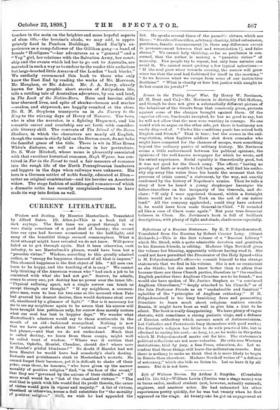• (1.) Prisoners of Hope. By Constanoe Smith. London: A.
D. Innee and Co. —(2.) Her Memory. By Maarten Maartens. London : Macmillan and On.—. (3.) The Battle of the Strong. By Gilbert Parker. London : Methuen and Co. —(4 ) roe lied Axe. By el. IL Crockett. London : Smith and Bider.—(5.) Hope the Hermit. By Edna Lyall. London : L.:lumens and 0o.—(6.) A Lover of Truth. By Eliza Orne White. London: bmith and Xlder.—(7.) The Custom of the Country an Idyll of the Welsh Mountains. By John Finuemore. Loudon: Lawrence and Bonen. —00 Herd Rni'ly. By W. Pett Hideo. London : 0. A. Pearson.— (9.) The Luck of the Native-Born. By J. A. Barry. London: Macqueen.—(10.) An Enemy to the King. By E. N. Stephens. London: Methuen and 0o.—(11.) The Island of the Seven Shadows. Br Boma White. London: A. O. Innes and Co.—(12.) Far in the Forest. By 13, Weir
Mitchell, LL.D. (Harvard). London: T. Fisher Unvrin.
the armchair order, and breaks down hopelessly under the stress of actual contact with the squalor of the slums. Being placed, by the indulgence of her husband, temporarily in touch with the old life, she becomes more acutely sensible of the limitations of the new. Linda Ainslie, however, though wanting in resolution and nobility of character—though essentially selfish, prone to self-pity, and "totally unprovided with spiritual nerves," is exceedingly quick-witted, and shows an ingenuity and resourcefulness in evading her responsibilities which on more than one occasion enable her to turn the tables on her sorely tried and devoted husband. She is clever enough to pierce the heart of his secret—a temporary loss of faith— and cruel or callous enough to turn it to her own advantage. As her absences from Pentonville become more protracted, and she abandons philanthropy for amusement, Dalyell, her husband's greatest friend, loyally undertakes the charge of ward- ship, with the special view of shielding her from the attentions of an unscrupulous admirer. Whereupon Linda, resenting hie well-meant, if not always discreet intervention, contrives by mendacity and coquetry to estrange Dalyell from the real heroine of the story. And yet, in spite of this elaborate, and even merciless, study in feminine meanness, the tone of the book is stimulating and its lessons helpful. The chapters which tell of Elizabeth Thornton's lonely but heroic death- bed, of her lover's hard-fought struggle before he could realise "the glory of going on," and, finally, of Richard Ainelie's forgiveness of his erring wife, bring the novel to a conclusion which is not only moving but natural. The good and evil in Linda are clearly expressed in her final words : "I wish I were a different sort of woman. I shored like to have made you happy. But it's useless pretending," she added, quickly frightened by the transfiguration her words had produced. "I would care, as you want me to care—if I could; but I can't. There is no more to be said about it."
Like Mr. Norris in his latest novel, Mr. Maarten Maartens takes a widower with an only daughter as the central figure of Her Memory. The general resemblance is accentuated by the fact that both widowers are English country gentlemen who have travelled a good deal on the Continent, both enter Parliament and attain office. There, however, all resemblance ceases. Mr. Norris's hero made an unhappy marriage and could not be tempted to try his fortune again. Anthony Stollard, in the novel before us, after being literally crazed at the loss of his first wife, vindicates the popular estimate of incon- solable husbands by taking the contrary course, or perhaps we should say by gratefully allowing himself to be married by an extremely capable and wealthy widow. Anthony is an essentially complicated character—cosmopolitan and kaleido- scopic, as he himself admits—and his whole record belies the possibility of those facile Parliamentary triumphs which the author merely notes without attempting to explain. His hysterical grief alienates our sympathies at the outset ; his sorrow is largely tempered with self-pity, and there is something morbid in his "nostalgia for enjoyment" and resentment of compassion. Philistine readers will say that Anthony Stollard deserved neither his saintly first wife nor her eminently mundane but good-hearted successor ; senti- mentalists will never forgive him for the disloyalty to "her memory" involved in the public exhibition of the picture of his dead wife painted by himself. If, however, the story suffers in attractiveness from the ignoble vacillation of the central figure, it is redeemed by the excellent portraiture of the minor characters. The daughter is a really touching figure, and Lady Mary's vigorous, genial, though undis- tinguished personality is very skilfully conveyed. We cannot part company from this clever but depressing study in the cult of the deceased wife without expressing admiration for the author's mastery of our language, and his knowledge of our social usages. The only slip we have detected is a reference to the "Empress Victoria," while the name of Anthony's place, " Thurdles," recalls such achievements in pseudo-English nomenclature as the "Miss Rovel " of Cherbuliez.
Mr. Gilbert Parker is careful to let it be known that The Battle of the Strong has no claim to be called an historical novel, though the plot hinges on an historical event—the abortive invasion of Jersey in 1781 by the so-called Baron de Rnllecourt—and one of the chief figures is admittedly modelled on that romantic and ill-starred personage, Philip d'Auvergne. Philip d'Avranche, like his prototype, is a. Jerseyman of noble French descent who serves with distinc- tion in the British Navy, and, on being taken prisoner after a gallant fight against heavy odds, is adopted as his heir by his kinsman, the Duo de Bercy. Philip is already secretly married in Jersey to Guide Landresse, the granddaughter of a noble emigre, but withholds this fact from the Duke, and, sacrificing duty and love at the altar of ambition, accepts the bride provided by his adoptive father. Guida is heartbroken on hearing the truth, for the record of her marriage has been stolen, and the only witnesses have died or disappeared. Her grandfather dies of the shock, and she hides her shame in a remote corner of the island, living only for her child, until Philip's return as Admiral of the British squadron. Then before the Assise d'Heritage she accuses him of having kid- napped her son, challenges him to deny that she is his lawful wife, and—the missing marriage-lines being produced at the crucial moment—wine her case, and establishes the legitimacy of her child. Philip dies of the wounds received in a duel with a kinsman of the Countess de Chantavoine—his French wife and Guida ultimately marries Detricand, Prince of Vanfon. tame, a French officer who had stayed on in Jersey after Rullecourt's defeat, and subsequently won fame under Roche- jaquelein in the Vendee. Detricand, it should be added, dispossesses Philip of his duchy, and after establishing his own claim, adopts Guidaes son as his heir. The story is full of colour, incident, and animation ; but we confess to finding the leading characters and the chief situations dramatically impressive rather than lifelike. Detricand's conversion from a sot to a hero is all too sudden, and Philip is a picturesque rather than a convincing scoundrel. Ambi- tion is a powerful motive, but given the conditions of the case, and above all Philip's patriotism (which is always insisted on), we do not find it adequate to account for his treachery. As a picture of life and manners in Jersey the book is decidedly attractive. It is furnished with a glossary, a map of the island, and a reproduction of Copley's picture, "The Battle of Jersey," a much more sensible and more satisfactory mode of illustrating a romance of this sort than that usually adopted.
The temper of Mr. Crockett's new romance is faithfully illustrated by a comment of the narrator-hero,—"I could have disembowelled the villain." Mr. Crockett is a perfectly wholesome and high - spirited writer, but he has no artistic reticence; and this violence of expression, though appropriate enough in certain situations, grows wearisome in the long run. After a perusal of The Red Axe one feels as if one had been sitting in the pocket of a trombone player, or had travelled all night on an express engine. The hero of the story is the only son of the hereditary executioner of Duke Casimir of Thorn, and it is enough to say that the first victim on whom he is called to try his prentice hand is his own lady-love, unjustly condemned for witchcraft. This grand climax is led up to through a con- stant succession of startling incidents, sentimental, gruesome, and heroic, but the effect is largely neutralised by the extravagance of expression already noted. The heroine is called "the Little Playmate," a term of endearment which palls terribly with constant repetition, and the strenuous skittishness of some of the tender passages is nothing short of exasperating to those who hold with Steele that love is a liberal education.
In Hope the Hermit, Miss Edna Lyall weaves a pleasant romance out of the fortunes of several Cumberland families in the last decades of the seventeenth century. The hero is a foundling, who wreaks a noble revenge on his long-lost and selfish father by saving him at the risk of his own life from the consequences of complicity in a Jacobite plot, and is in turn rescued by the devotion of his lady-love. The magna- nimity of Michael Derwent is somewhat oppressive; but we own to having found Miss Lyall's amiable romance an agreeable sedative after the unmodnlated exuberance of Mr. Crockett. A Lover of Truth is an acute and sympathetic study of the growth and expansion of a reserved, sensitive, and high-minded nature. Miss Eliza Orne White delineates the still life. of New England society with unfailing charm and geniality. Mr. John Finnemore in The Custom of the Country gives curious rather than edifying picture of Welsh manners and morals. His book at least helps us to realise that the Welsh in many respects are further from us than the Irish. Me. Pett Ridge's Mord Em'ly (Cockney for Maud Emily)
touches in the main on the brighter and more hopeful aspects of slum life,—the heroine's abode, we may add, is appro- priately fixed in Pandora Buildings. Mord Einly's ex- periences as a camp-follower of the Gilliken gang—a band of female "Hooligans "—her adventures as a, " general " and a " Veg" girl, her relations with the Salvation Army, her court- ship and the events which led her to go out to Australia, are narrated in such a way as to endear to the reader this audacious but large-hearted little Amazon of the London "back blocks." We cordially recommend this book to those who only know the East End by reading the works of Mr. Morrison, Mr. Maughan, or Mr. Adcock. Mr. J. A. Barry, already known for his graphic short stories of Antipodean life, tells a rattling tale of Australian adventure, by sea and land, in The Luck of the Native-Born. Hero and heroine alike bear charmed lives, and spite of sharks—human and marine —snakes, and shipwreck, are happily reunited at the close. Mr. R. N. Stephens transports us in An Enemy to the King to the stirring days of Henry of Navarre. The hero, who is also the narrator, is a fighting Huguenot, and his romantic career and courtship are set forth with consider- able literary skill. The contents of The Island of the Seven Shadows, in which the characters are neatly all English, though the scene is chiefly laid on the Breton coast, do not belie the fanciful grace of the title. There is wit in Miss Roma White's dialogue, as well as charm in her portraiture. Dr. S. Weir Mitchell, whose name is pleasantly associated with that excellent historical romance, Hugh Wynne. has con- trived in Far in the Forest to read a fair measure of romance into the rough life of the North Pennsylvanian lumberers and loggers in the days when railways were unknown. His hero is a German settler of noble family, educated at Eton— rather an original combination—and his heroine an American widow. The stage fashion of middle-aged romance—of which a dramatic critic has recently complained—seems to have made its way into fiction as well.
CURRENT LITERATURE.
Wisdom and Destiny. By Maurice Maeterlinck. Translated by Alfred Sutro. (G. Allen.)—This is a book full of dark sayings. The first time we groped through it we were dimly conscious of a good deal of beauty; the second time our eyes had become accustomed to the half-light, and many of the beautiful things seemed commonplace. What a third attempt. might have revealed we do not know. Will-power failed us to get through again. Had it been otherwise, such industry, to use Ilaeterlinck's phrase, would have been but a "parasitic virtue." Wisdom, according to this greatly admired author, is "energy for happiness cleansed of all that is impure." This cleansed happiness is the first object of life. "All men can learn to be happy, and the teaching of it is easy." We cannot help thinking of the American woman who "had such a job to be contented with what she had not got." Sorrow, he admits, comes to every one, yet destiny has no power over the inner life. " Physical suffering apart, not a single sorrow can touch us except through our thought." "If my neighbour, a common- place man, were to lose his two sons at the moment when Fate had granted his dearest desires, then would darkness steal over all, unrelieved by a glimmer of light." "Nor is it necessary for me to see my neighbour again to be aware that his sorrow will have brought him pettiness only, for sorrow does merely restore what our soul has lent in happier days." We wonder what Maeterlinck's admirers would say to these sentiments in the mouth of an old - fashioned evangelical. Nothing is new that we have quoted about this "natural man" except the last phrase,—and that we do not understand. Much that is called destiny, we learn from these essays, might well be called want of wisdom. "Where was it written that Laertes, Ophelia, Hamlet, Claudius, should die ? where save in Hamlet's pitiful blindness ?" No doubt if Hamlet had not been Hamlet he would have had somebody's else's destiny. Rewards and punishments stink in Maeterlinck's nostrils. He cannot forget their baseness, yet it is difficult to shake off their yoke; even those, he laments, "who have given up the narrow morality of positive religion" find, "in the face of the event," that they are "governed by the axioms of their childhood." Of more avail would be a "list of the chastised virtues." "The soul that is quick with life would find its profit therein, the cause Of virtue would gain in vigour and majesty." A list of virtues, ehagthied or otherwise, seems a dull substitute for "the morality of positive religion." Still, we wish he had appended the












































 Previous page
Previous page